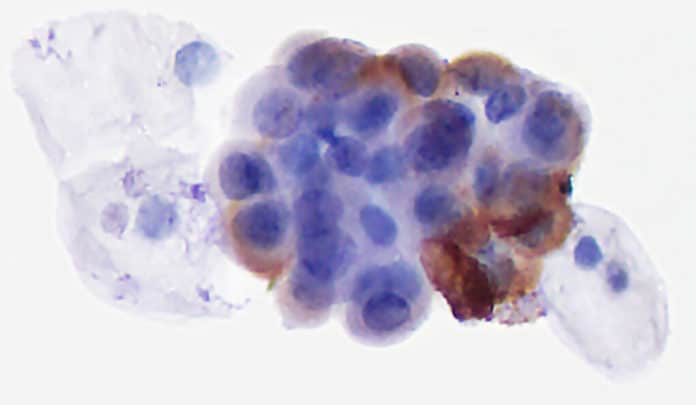Urothelial carcinoma is the most common type of bladder cancer that starts in the urothelial cells that line the inside of the bladder. The accurate detection of urothelial carcinoma (UC) is often tricky and expensive, requiring invasive camera-based testing methodology.
Currently, clinicians used methods based on subjective microscopic features that may not reliably distinguish between benign cells and low-grade urothelial carcinomas. Hence, there is an urgent need to find biomarkers to improve diagnostic accuracy for UC.
A new study by the Yale Cancer Center, Stony Brook University, and KDx Diagnostics, Inc has now developed a new urine screening test to detect bladder cancer. Their test uses a novel Keratin 17 (K17) cancer biomarker to detect the presence of new bladder cancer in patients with hematuria or blood in the urine.
After following up on past studies, scientists confirmed that the new test is a susceptible diagnostic test for initial screening and detection of recurrent cancer across all grades of UC.
The study was characterized by two matched cohorts: a revelation cohort. The optimal number of positive cells for optimal affectability and particularity was recognized, and a validation cohort in which another set of patients was assessed.
Invalidation cohort, the sensitivity, and specificity in patients were 86% and 92%, respectively.
When the patients were divided into hematuria and recurrent bladder cancer populations, the data showed sensitivity and specificity of 100% and 83%, respectively, in patients with hematuria and sensitivity and specificity of 92% and 100%, respectively, with recurrent bladder cancer.
Nam W. Kim, Ph.D., chief executive officer and chief technology officer of KDx Diagnostics, Inc., said, “We are pleased to report that the test using a K17 biomarker continues to show high sensitivity in identifying both new cancers from hematuria patients and recurrent cancer from patients being monitored for UC. There is now a growing body of evidence that the non-invasive K17 urine test will make a significant positive impact on detection and management of UC.”
Journal Reference:
- Sruthi Babu et al. Keratin 17 Is a Novel Cytologic Biomarker for Urothelial Carcinoma Diagnosis. DOI: 10.1093/ajcp/aqab050
